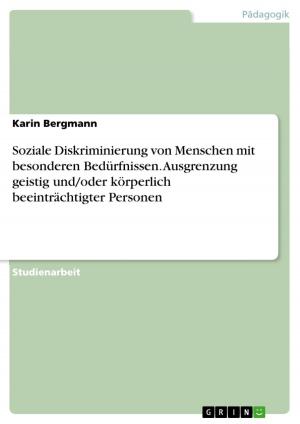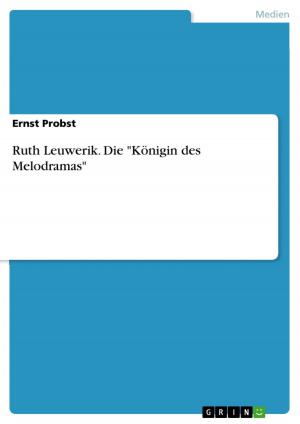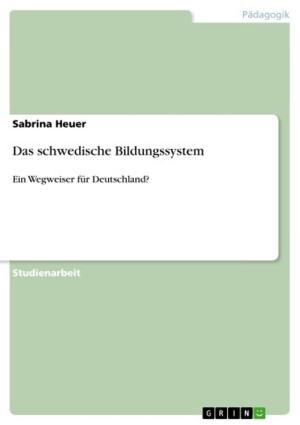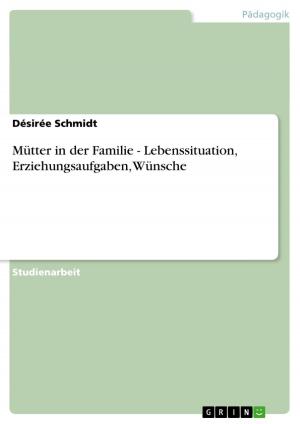Integration and Assimilation in Monica Ali's Novel 'Brick Lane'
Nonfiction, Reference & Language, Study Aids, ESL, Foreign Languages| Author: | Anastasia Sherstneva | ISBN: | 9783656918370 |
| Publisher: | GRIN Verlag | Publication: | March 12, 2015 |
| Imprint: | GRIN Verlag | Language: | English |
| Author: | Anastasia Sherstneva |
| ISBN: | 9783656918370 |
| Publisher: | GRIN Verlag |
| Publication: | March 12, 2015 |
| Imprint: | GRIN Verlag |
| Language: | English |
Seminar paper from the year 2012 in the subject English Language and Literature Studies - Culture and Applied Geography, grade: 1,7, University of Hildesheim (Institut für Interkulturelle Kommunikation), course: Empire and Literature, language: English, abstract: Monica Ali is a British author who was born in 1967 in East Pakistan (as Bangladesh was called then) to a Bangladeshi father and English mother. The family had to move to England due to the civil war in 1971. Monica Ali studied Philosophy, Politics and Economics at Wadham College, University of Oxford and later worked in design and publishing. Brick Lane, her debut novel, caused a sensation and controversy back in 2003 when the novel was first published, and again in 2007 when the novel was made into a film. Brick Lane is about a Bangladeshi woman who came to England at the age of eighteen due to an arranged marriage knowing only two words in English: 'sorry' and 'thank you'. Nazneen struggles to adjust to her new life as a wife and an immigrant in a new country. On her journey of adjusting she learns new things ('ice e-skating', making money by sewing, the English language) and makes new friends. One of them, a younger man, even becomes her lover. He opens a new world for her and contributes a lot to her personal growth. She finds strength to fight against a mean usurer and even Fate itself. The novel brings up a lot of issues for discussion, such as feminism, racism, post-colonialism, fatalism, Islam in a modern multicultural society, and problems of cultural minorities. In this paper I would like to consider problems of integration of such cultural minorities in the modern British society as exemplified by three families described in Monica Ali's novel Brick Lane.
Seminar paper from the year 2012 in the subject English Language and Literature Studies - Culture and Applied Geography, grade: 1,7, University of Hildesheim (Institut für Interkulturelle Kommunikation), course: Empire and Literature, language: English, abstract: Monica Ali is a British author who was born in 1967 in East Pakistan (as Bangladesh was called then) to a Bangladeshi father and English mother. The family had to move to England due to the civil war in 1971. Monica Ali studied Philosophy, Politics and Economics at Wadham College, University of Oxford and later worked in design and publishing. Brick Lane, her debut novel, caused a sensation and controversy back in 2003 when the novel was first published, and again in 2007 when the novel was made into a film. Brick Lane is about a Bangladeshi woman who came to England at the age of eighteen due to an arranged marriage knowing only two words in English: 'sorry' and 'thank you'. Nazneen struggles to adjust to her new life as a wife and an immigrant in a new country. On her journey of adjusting she learns new things ('ice e-skating', making money by sewing, the English language) and makes new friends. One of them, a younger man, even becomes her lover. He opens a new world for her and contributes a lot to her personal growth. She finds strength to fight against a mean usurer and even Fate itself. The novel brings up a lot of issues for discussion, such as feminism, racism, post-colonialism, fatalism, Islam in a modern multicultural society, and problems of cultural minorities. In this paper I would like to consider problems of integration of such cultural minorities in the modern British society as exemplified by three families described in Monica Ali's novel Brick Lane.















